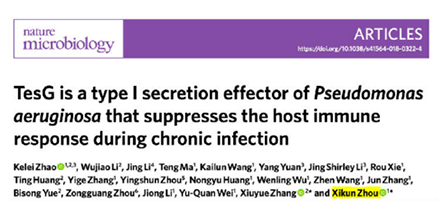
Recently, a team led by Dr. Zhou Xikun from the State Key Laboratory of Biotherapy joined hands with the team led by Dr. Zhang Xiuyue from the School of Life Science of Sichuan University to release a research article of TesG Is a Type I Secretion Effector of Pseudomonas Aeruginosa That Suppresses the Host Immune Response during Chronic Infection on the internationally recognisable academic journal Nature Microbiology (Impact Factor14.174 ). Dr. Zhou Xikun and Dr. Zhang Xiuyue are the co-corresponding authors.
Pseudomonas aeruginosa is a kind of important opportunist pathogen, which can cause the morbidity in a couple of organs of flora and fauna, as well as human beings, particularly for the patients with incomplete immune functions, including burnt patients, pulmonary cystic fibrosis patients, patients with chronic obstructive lungs and patients suffering from bronchiectasia, posing a big threat to the health of the masses. P. aeruginosa has a large genome compared with other clinical isolated pathogens; therefore, this kind of bacterium can adapt to the environment by means of its complicated and changeable intracellular regulatory mechanism, and cause the acute and chronic lung infection by means of different intracellular metabolism and virulence systems.
The two teams working closely together disclosed a new mechanism in which P. aeruginosa triggers the chronic lung infection. The researchers have successfully constructed the animal model (mouse) for the acute and chronic lung infections and analyzed the expression profile of the P. aeruginosa in two different intrusion modes through the in situ transcriptome sequencing. Consequently, they found that P. aeruginosa can regulate the composition of the effect protein called TesG through the Quorum-sensing, and then secrete the TesG protein into the external environment of cells through the type I secretory system termed Tes-T1SS in the chronic lung infection. After deleting the effect protein TesG, the chronic infection ability of the mouse lung mediated by the P. aeruginosa has obviously lowered. The in-depth mechanism research discovered that the TesG protein can enter the macrophage by clathrin-mediated endocytosis, and restrain a series of inflammatory reaction of cells, e.g. the recruitment of inflammatory cells, the cytoskeletal rearrangement as well as the adhesion and phagocytic ability of the macrophage, by means of the competitive inhibition activation of eukaryocyte small GTPases (e.g. RhoA).
To sum up, this new-type effect protein TesG secreted by the type I secretory system of the P. aeruginosa led to the formation and maintenance of the bacterial lung chronic infection through the inhibition of the host immune response. This finding also verified that the eukaryocyte small GTPases play an important role in the interaction between the pathogenic bacteria and the host, and indicated that the targeted intervention of TesG’s inhibition of the small GTPases can provide a new treatment strategy for the chronic lung infection caused by the P. aeruginosa.
Link to the original text: https://www.nature.com/articles/s41564-018-0322-4
Zhou Xikun, associate researcher of the State Key Laboratory of Biotherapy, postgraduate tutor of the West China Hospital of Sichuan University, and Reserve Candidate of the Academic and Technological Research Leaders of Sichuan Province. He is mainly devoted to the innate immunity signal transduction of the inflammatory associated diseases. Over the recent years, he has published several research articles on academic journals such as Nature Microbiology (2016, 2019), Molecular Cellular Biology (2015), Nature Communications (2014) and Neoplasia (2013) as the (co-)first author or the (co-)corresponding author.